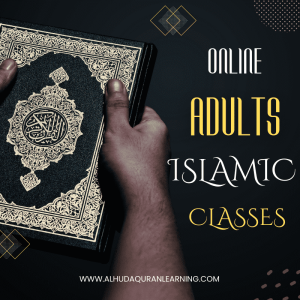Islamic Prayers Lessons Online for Kids & Adults
Original price was: $50.00.$39.00Current price is: $39.00.
Course Description
Participants will learn the fundamental concepts and practices of Islamic prayers (Salah) and develop the skills to perform them independently. The final project involves creating a personalized prayer guide that incorporates learned concepts, tailored to individual or family use.
Description
Prayer lessons in the Al Huda Quran learning academy are valuable to the curriculum. Prayer is an essential part of the Islamic faith. Worship teaching students about prayer guidance and how to perform prayers and understand their significance in their lives is important.
Students learn about prayer guidance, including how to perform Ablution (wudu) and prayer, and why it is important. They also learn about different prayer types, postures, and benefits, both spiritual and emotional. These lessons help students understand and practice the Islamic faith, develop a strong connection with Allah (SWT), and lead a more meaningful and fulfilling spiritual life.
Course Outline of Prayer Lessons Course
Module 1: Introduction to Salah
- Learning Objectives:
Understand the significance of Salah in Islam.
Identify the five daily prayers and their times.
- Case Studies:
A day in the life of a Muslim observing Salah.
- Activities:
Create a daily prayer chart.
Video: A day with Salah – connecting daily life with prayer times.
- Discussion Questions:
Why is Salah important in Islam?
How does observing Salah impact daily life?
- Expanding Learning:
Research the history and spiritual significance of Salah.
Module 2: Preparations for Prayer
- Learning Objectives:
Learn Wudu (ablution) steps.
Understand the importance of cleanliness and focus.
- Case Studies:
Video demonstration of Wudu.
- Activities:
Practicing Wudu steps.
Video: The role of cleanliness in Salah.
- Discussion Questions:
What does cleanliness symbolize in Islam?
How does preparation affect your mindset for prayer?
Module 3: Learning the Words
- Learning Objectives:
Memorize the words of the Salah.
Understand their meanings.
- Case Studies:
Stories of Prophets and their prayers.
- Activities:
Flashcards for Salah’s vocabulary.
Video: The power of words in Salah.
- Discussion Questions:
How does understanding the words enhance your prayer experience?
Discuss the importance of Arabic in Salah.
Module 4: Physical Aspects of Salah
- Learning Objectives:
Master the physical movements of Salah.
Understand their symbolic meanings.
- Case Studies:
Demonstrating Salah in various environments.
- Activities:
Practice sessions with guided instructions.
Video: Salah movements and their symbolism.
- Discussion Questions:
How do the physical movements complement the spiritual aspects of Salah?
Discuss the balance between form and intention in prayer.
Module 5: Incorporating Duas and Personal Prayers
- Learning Objectives:
Learn about Duas and their place in Salah.
Create personal supplications.
- Case Studies:
Personal stories of Duas.
- Activities:
Writing and sharing personal Duas.
Video: The personal touch in Salah–Duas.
- Discussion Questions:
How does Duas personalize your Salah experience?
Share a Dua that is special to you.
Module 6: Creating Your Personal Prayer Guide
- Learning Objectives:
Compile knowledge from previous modules into a practical guide.
Personalize the guide for individual or family use.
- Case Studies:
Examples of personalized prayer guides.
- Activities:
Assembling a prayer guide with reflections and learnings.
Video: Crafting your journey in Salah – The Prayer Guide.
- Discussion Questions:
How does creating a prayer guide consolidate your learning?
Discuss ways to maintain and evolve your prayer practice.
Final Project Plan:
Create a personalized Islamic prayer guide incorporating:
- Selections of Duas and personal reflections.
- A schedule for daily prayers.
- Illustrated steps of Wudu and Salah movements.
- Explanations of the meanings behind Salah components.
- Personal stories or experiences connecting with Salah.
Fee Structure of online prayer lessons course
| Category | Session Duration | Frequency | Fee (Per Month) |
|---|---|---|---|
| 1:1 Classes Online | 30 minutes | 5 days a week | $120 |
| 1:1 Classes Online | 30 minutes | 4 days a week | $90 |
| 1:1 Classes Online | 30 minutes | 3 days a week | $65 |
| 1:1 Classes Online | 30 minutes | 2 days a week | $30 |
How to pray during different times of the day (Fajr, Zuhr, Asr, Maghrib, Isha)
Muslims are required to perform five daily prayers at specific times of the day. Here’s a brief overview of how to pray during different times of the day:
Fajr prayer: Performed before sunrise, this prayer consists of four rak’ahs.
Zuhr prayer: Performed in the early afternoon, this prayer consists of twelve rak’ahs.
Asr prayer: Performed in the late afternoon, this prayer consists of eight rak’ahs.
Maghrib prayer: After sunset, the performance was carried out. This prayer consists of seven rak’ahs.
Isha prayer: Performed in the evening, this prayer consists of seventeen rak’ahs.
Importance of prayer and how to pray
Every religion has rituals and traditions of prayer, which are considered a fundamental part of the practice of faith. For Muslims, prayer is one of the Five Pillars of Islam and is performed five times daily. Some important guidelines for prayer are:
Importance of prayer:
- Provides a direct means of communication with Allah (SWT)
- Helps individuals stay mindful of their faith and maintain a sense of connection to Allah (SWT)
- Offers an opportunity for reflection, gratitude, and seeking guidance
- Helps to develop a deeper sense of inner peace and calm
- Provides a sense of community and connection with others who share a similar faith
- Nourish the notion of paying back to society or develop a sense of giving back to the community
How to pray:
- Perform Ablution (wudu) to purify oneself physically before prayer
- Find a clean, quiet place to perform prayer
- Face the qibla (direction of the Kaaba in Makkah)
- Recite the opening Takbir (Allahu Akbar) to begin the prayer
- Recite specific prayers in Arabic, including recitations from the Quran
- Follow the specific movements and postures of the prayer, such as standing, bowing, and sitting
- Complete the prayer with the closing salaam (peace greeting)
Common mistakes in prayer and how to avoid them
As with any practice, it is common for individuals to make mistakes when learning how to pray. Recognizing and correcting these mistakes is an important part of prayer lessons.
- Rushing through prayer: Taking time to perform prayer with focus and concentration is important. Rushing through the movements and recitations can result in a loss of connection and meaning.
- Need to perform the movements correctly: Proper alignment and posture are important in prayer. Incorrect movements can impact the efficacy of the prayer and even lead to physical injury.
- Not performing Ablution (wudu) correctly: Before prayer, performing Ablution is a prerequisite. Incorrectly performing it can result in impurity, ultimately causing the prayer to become invalid.
- Not facing the correct direction: Facing the qibla is essential in prayer. Please do so to ensure the validity of the prayer.
- Losing focus during prayer: Distractions can easily derail the focus and concentration required for prayer. Taking steps to eliminate distractions is important.
By learning the proper technique and remaining mindful and present during prayer, it is possible to avoid these common mistakes. Prayer lessons can provide guidance and support in developing a stronger and more meaningful prayer practice.
Frequently Asked Questions (FAQ’s)
What are Prayer lessons?
Prayer lessons are educational classes that guide the proper way to perform Islamic prayers.
What topics are covered in Prayer lessons?
It covers various topics including how to perform the prayer, common mistakes to avoid, supplications and Quranic recitations, and developing a consistent prayer practice.
How can I enroll in Prayer lessons?
You can either visit Al Huda Quran online website and look for the section on prayer courses or contact their customer support for more information. They offer a range of online courses on prayer and other Islamic topics that can be accessed anywhere in the world. It has a specific registration requirement; you have to check with customer support or follow the instructions on the website to enroll in Prayer lessons.
Who can benefit from prayer lessons?
Regardless of their knowledge or experience, anyone can benefit from prayer lessons to improve their understanding and practice of Islamic prayer.
Do you need wudu to perform prayer?
Yes, you can perform Ablution (wudu) is a necessary step before performing Islamic prayer, as it purifies the body and prepares an individual for worship.
What are the steps to performing Ablution (wudu)?
Here are the steps to perform Ablution (wudu) in the correct order:
- Make the intention to perform Ablution (think that you’re going to clean yourself).
- Say Bismillah (in the name of Allah) and wash both hands three times.
- Rinse your mouth three times.
- Clean your nose by inhaling water and then blowing it out three times.
- Wash your face three times, starting from the hairline to the chin, and from ear to ear.
- Wash both arms, including the elbows, three times, starting with the right arm and then moving to the left.
- Wipe your head once with wet hands, moving them from the front to the back and back again.
- Wash both feet up to the ankles three times, starting with the right foot.
- Say the declaration of faith (Shahada) after completing the Ablution.
Conclusion
Al Huda Quran Learning Academy is a great place for people who want to learn about Islamic prayer. Academy offers many courses that cover different parts of prayer, like how to do it properly and why focus and intention are important. The teachers are very good and have a lot of knowledge to share. Everyone can take the courses, no matter where they live or what they know about prayer. It’s a really helpful place for anyone who wants to learn more about prayer in Islam. Overall, if you want to learn more about prayer coaching, Al Huda Quran Learning Academy is an excellent platform to explore.







Reviews
There are no reviews yet.